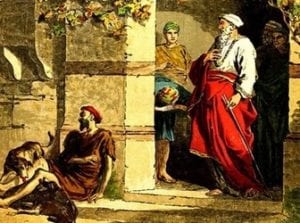
The Demand for Signs
The parable of the rich man and Lazarus is a basis for the Catholic belief in the Particular Judgment: that immediately after death, the deceased person is judged by God for all its acts, and the eternal fate of the departed soul is decided. In the parable, Lazarus was carried by the angels to the bosom of Abraham where he is comforted, while the rich man ended up in the torments of the netherworld. And so, what determined this outcome? The rich man was not condemned because he was rich and enjoyed life, but because he did not pay attention to the suffering of others, especially those right at his door. The rich man’s sin was not a sin of commission, but a sin of omission. On the other hand, Lazarus did not ask for much and he merely longed to eat scraps that fell from the rich man’s table. Lazarus went to heaven not so much because he was poor or suffered much during his lifetime, but rather he went through the hardships of life uncomplainingly – a sign of holiness in which he accepted the will of God.
The parable also points out that divine revelation is, by itself, sufficient for people to be persuaded to live a life that is right and just. The rich man’s request for a sign embodies what so many people say to God: “If you really want us to believe in You and live our lives in the way that You want us to, then send us someone from the next world who can tell us that it is really so.” By asking Abraham to send Lazarus on an errand to warn his five brothers, the rich man acted as if he had not been treated fairly in that he had not been given all the information he needed so that he might have acted differently.
The demand for signs has been repeated in the Gospels of Matthew and Luke, especially when the scribes and the Pharisees asked for a sign, but Jesus told them that “this generation is a wicked generation; it seeks a sign, but no sign will be given to it but the sign of Jonah” (Mt12:39f, Lk11:29f). God’s greatest sign for mankind is Jesus himself; He is God’s ultimate revelation. In Christ, God entered into human history to show us the way, the truth and the life. People who cannot be persuaded to change their lives because of Jesus, the Word of God, will neither be persuaded if someone appears from the next world. God has already given us all that we need. We have Jesus Christ, his teachings, his presence in the Eucharist, as well as his grace dispensed through the sacraments of the Church through the Holy Spirit, so that we may live a life that knows and loves God, and ultimately to be with Him in eternity.

Congratulations to John and Antonia Fu on their 50th Wedding Anniversary and on the renewal of their marriage vows. We will have a special cake to celebrate. May God bless them and may they have many more happy years together!

MARYKNOLL STUDENT ESSAY CONTEST is open to all students from Grades 6 to 12. The theme is to explain how and with whom you share the Good News of God’s love. Submission deadline is November 15, 2019. Entry forms are available at the parish office or can be downloaded from our church website.

The Garage Sale is on Saturday, October 5 from 8am to 3pm. If you can help sort out the items or be present on Saturday to help anytime during the day, please contact Agnes or Angela Lau.
October 4 is the feast day of St. Francis of Assisi. In commemoration of St. Francis’ feast day, we will have St. Francis Almond Cookies for everyone. These almond cookies were St. Francis’ favorite. The recipe date back to around 1200 AD and belonged to Blessed Jacoba, who was one of St. Francis’followers.

St. Francis Almond Cookies
1 3/4 cups whole almonds
1 cup sugar (reduce sugar as desired)
2 tablespoons flour
1/8 teaspoon salt
4 large egg whites
1 teaspoon almond extract
1/4 cup sliced almonds
Toast whole almonds in 300° oven 5 minutes. Cool. Place in food processor with sugar, flour, and salt. Process until finely ground. Add egg whites and extract. Arrange on parchment covered baking sheet. Decorate with sliced almonds. Bake at 300° for 25 minutes. Yield: 4 dozen cookies.